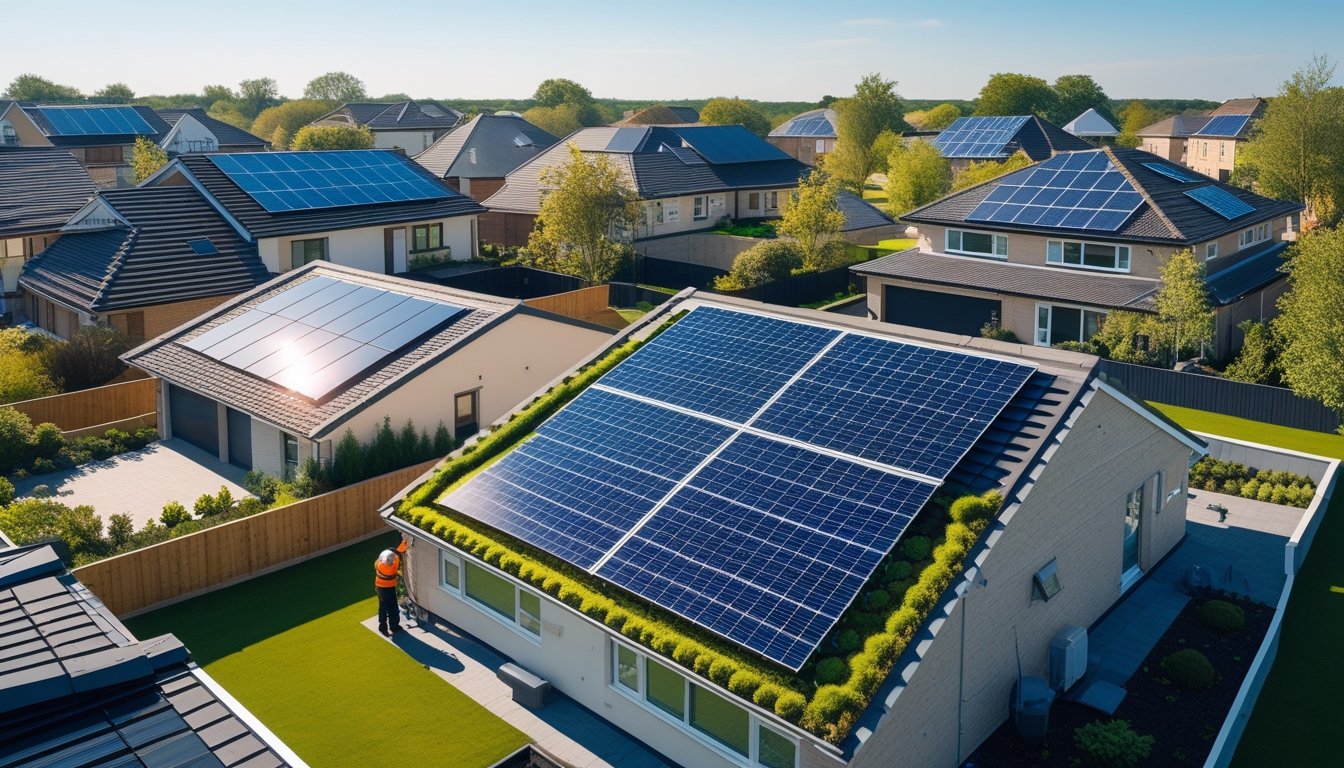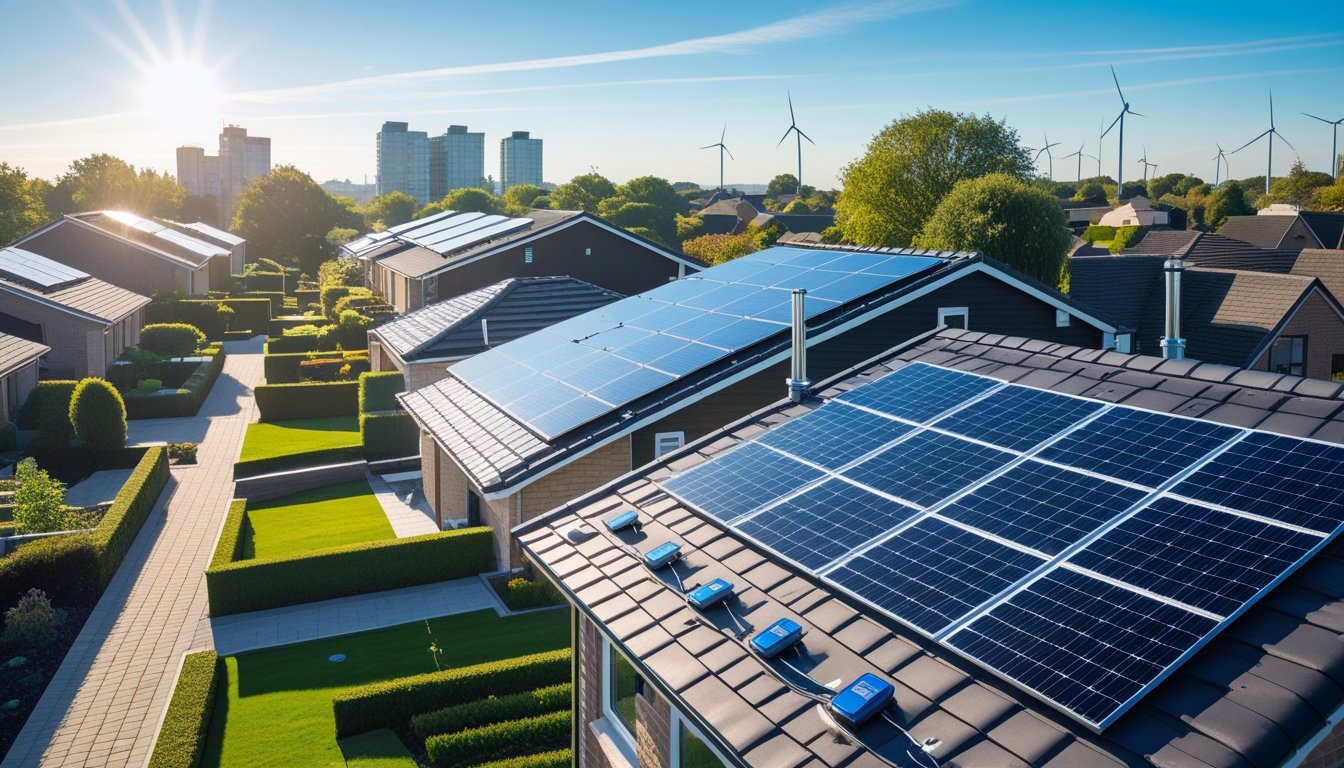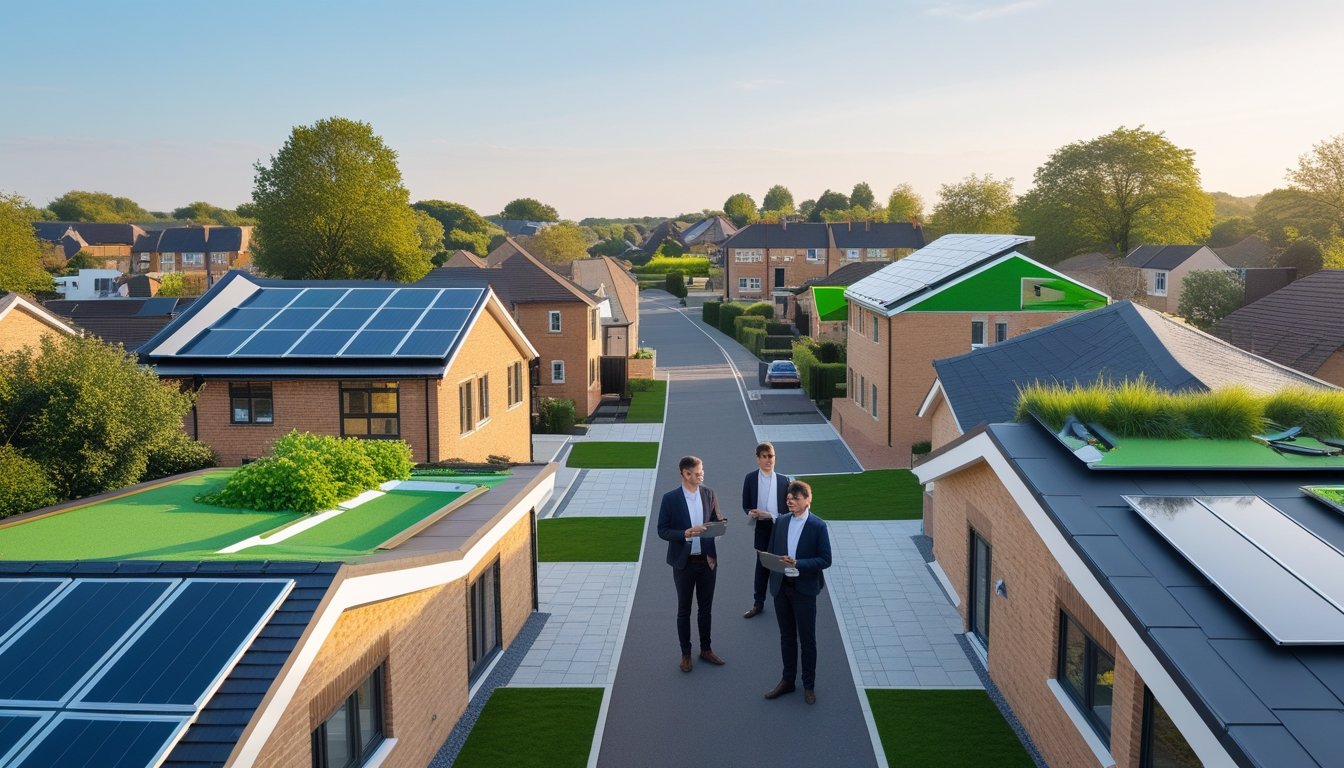Late updated: 21 Jul 2025 09:07
Written by: Oliver Bennett
Exploring UK Roof Sustainability Innovations: Advancements and Benefits
The United Kingdom's roofing industry is undergoing a transformative period of innovation and sustainability advancements. From eco-friendly materials to cutting-edge solar technologies, roofing solutions are increasingly prioritising environmental impact without compromising on performance. The commitment to sustainable roofing is not merely a trend; it's an essential evolution driven by both technological advancements and ecological necessity.

Sustainability innovations in roofing have introduced a variety of eco-friendly materials and smart technologies that optimise energy efficiency. Sophisticated coatings, solar-integrated systems, and intelligent IoT solutions offer homeowners and businesses a path towards reduced energy consumption and enhanced building performance. These advancements signify not only a shift in industry standards but a meaningful stride towards environmental responsibility.
By integrating sustainable practices, we can transform roofs into active components of energy efficiency and environmental stewardship. This exploration of innovations highlights how the UK's roofing sector is adapting to new challenges and opportunities, ensuring that buildings are resilient, efficient, and environmentally friendly.
Key Takeaways
- UK roof sustainability is driven by eco-friendly and smart tech innovations.
- Advanced materials and solar tech enhance roof efficiency.
- Roofs are becoming integral to energy and environmental goals.
Key Innovations in UK Roof Sustainability
In recent years, the roofing industry in the UK has seen significant advancements in sustainable practices. By leveraging cutting-edge materials, integrating renewable energy solutions, and enhancing urban environments, we can create roofing systems that not only meet aesthetic and functional needs but also contribute to environmental sustainability.
Sustainable Roofing Materials: Graphene, Bio-Based, and Recycled Options
Graphene has emerged as a game-changer in sustainable roofing materials. This material is incredibly strong and lightweight, offering enhanced durability and thermal properties. Its potential to improve energy efficiency makes it highly attractive for eco-friendly roofing solutions. Meanwhile, bio-based materials, derived from renewable resources such as plant fibres, are gaining traction for their minimal environmental impact.
Recycled options, like recycled asphalt shingles, contribute to sustainability by reducing waste. These materials are often more cost-effective while maintaining quality and performance. Innovations in this space assist in minimising the carbon footprint associated with traditional roofing materials, providing a more sustainable alternative. Our focus on these innovations highlights a substantial shift in how roofing materials are selected and utilised in the UK.
Solar Roofing Systems and Renewable Energy Integration
Solar roofing systems have revolutionised how we think about energy use in buildings. By integrating solar panels directly into roofs, we can harness renewable energy without compromising aesthetics. Transparent solar panels, a recent innovation, allow for more versatile applications by blending seamlessly with existing structures, enhancing both functionality and appearance.
Implementation of solar energy solutions contributes significantly to reducing carbon emissions. In the UK, government incentives for adopting such technology can make it more financially accessible. This integration aligns with national goals for energy efficiency and sustainability, and we anticipate increased adoption of solar solutions as technology advances and costs decrease.
Green Roofs: Enhancing Urban Sustainability and Biodiversity
Green roofs offer a unique approach to urban sustainability. These systems incorporate vegetation layers on rooftops, providing insulation, reducing runoff, and improving air quality. Green roofs also create habitats for urban wildlife, promoting biodiversity in city environments. This innovation meets urban challenges by utilising space effectively to address environmental concerns.
In the UK, regulatory changes have encouraged the development of green roofs. They are increasingly seen as a viable solution for enhancing urban areas. By offering numerous environmental benefits while also integrating aesthetically with the built environment, green roofs represent an important step forward in modern roofing practices. Their role in sustainable urban planning continues to expand as awareness and technology improve.
Advancements in Energy Efficiency and Smart Roofing Technologies

As we navigate the transformation of the UK's roofing landscape, energy efficiency and smart roofing technologies stand at the forefront. These advancements have the potential to mitigate the urban heat island effect, dramatically reduce energy consumption, and integrate digital systems for optimal performance.
Cool Roofing Solutions for Reduced Urban Heat
Cool roofing solutions are vital as our cities grow and temperatures rise. Designed to reflect more sunlight and absorb less heat than standard roofs, these systems can significantly reduce the urban heat island effect. Light-coloured and reflective materials play a key role here. By decreasing the heat absorbed, cool roofs indirectly lower energy costs for air conditioning, mitigating greenhouse gas emissions.
In the UK, adopting cool roofing is particularly beneficial given the urban concentration and climate variations. Solutions like reflective paint coatings and special tiles help retain cooler temperatures, proving beneficial even beyond traditional summer months. Research shows that such installations can enhance overall city liveability, making our environments more sustainable.
Energy-Efficient Roof Designs in the UK
Energy-efficient roof designs are becoming more advanced, offering substantial energy savings and environmental benefits. Innovations include improved insulation materials, innovative ventilation techniques, and the integration of natural energy sources like solar panels. These designs aim to retain heat during the colder months and keep homes cool in the summer.
Energy-efficient roofing not only reduces energy bills but also contributes to a home's market value. In the UK, building regulations are promoting such designs. Government incentives can further motivate homeowners to adopt these sustainable solutions. Roof designs incorporating green elements such as vegetative layers serve both aesthetic and functional purposes, also improving air quality.
Smart Roofing Systems and Digital Integration
The digital age presents significant opportunities for smart roofing systems. These advanced systems incorporate sensors, automated ventilation controls, and real-time monitoring. By collecting data on weather conditions and internal temperatures, smart roofs adjust settings to optimise energy use. This dynamic adaptability makes them highly efficient.
In urban developments, digital integration enhances the communication between building systems. Solar shingles combined with Internet of Things (IoT) technology ensure better energy management and usage reporting. Such systems are particularly appealing in the UK, where weather conditions fluctuate. They provide a comprehensive approach to sustainability while accommodating modern living standards.
Frequently Asked Questions

In exploring the forefront of sustainable roofing innovations in the UK, we focus on advancements in green materials, integration of solar technology, adherence to regulatory standards, and the improvement of rainwater management and insulation. Let's address these key queries in this segment.
What are the latest advancements in green roofing materials in the United Kingdom?
Recent developments include the use of recycled materials and plant-based options that enhance the sustainability of roofs. Innovations in eco-friendly sealants and coatings have also improved energy efficiency and durability.
How does the UK integrate solar technology into sustainable roofing?
Solar panels are increasingly being integrated seamlessly into roofing systems. Building-integrated photovoltaics (BIPV) are becoming popular as they perform the dual function of being both a building material and a power generator, ensuring aesthetics are not compromised.
What are the regulatory requirements for sustainable roofing in the UK?
The UK has regulations that promote energy efficiency such as minimum insulation standards and the integration of renewable energy systems. Compliance with these requirements ensures that roofing solutions contribute to the nation's sustainability goals.
How are UK architects designing for improved rainwater harvesting in roof innovations?
Architects are designing roofs with integrated rainwater collection systems, using materials and slopes that optimise water diversion into storage systems. Green roofs also play a role as they naturally absorb and filter rainwater, reducing runoff.
What role does insulation play in the sustainability of UK roofs?
Insulation is crucial in reducing energy consumption by maintaining temperature control within buildings. Advanced materials such as sheep wool and cellulose are gaining traction for their natural efficacy in maintaining a balance between heat retention and dissipation.
How is the life cycle of roofing materials being improved for sustainability in the UK?
Manufacturers are focusing on enhancing the longevity of roofing materials through innovative treatments that prevent wear and promote weather resistance. Additionally, end-of-life recycling processes are becoming a standard practice to further reduce environmental impact.
